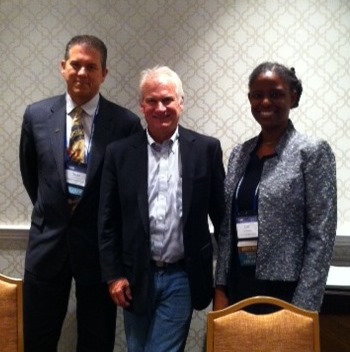Enrollment Diversity in Nuclear Engineering
By Rita Patel and Suzy Baker [originally published at Nuclear Undone]
A panel discussion on Enrollment Diversity and Nuclear Engineering was held last week at the American Nuclear Society conference in Washington DC, featuring:
David Roelant from Florida International University
Lisa Marshall from North Carolina State University
Craig Williamson from South Carolina Universities Research and Education Foundation
Perhaps Williamson summed up the current status best, beginning his presentation by saying:
"We still [stink] at diversity in the nuclear industry."
Fortunately, the three panelists (pictured below) offered innovative ideas for increasing diversity at nuclear engineering and technology programs on college campuses.
Roelant spoke on behalf of Florida International University (FIU), a school with a "majority minority" student population. He noted that FIU is the top producer of Hispanic graduates in the country. Many students at FIU are the first in the family to go to college. This can be attributed in part to community programs that FIU is involved in, which include a dual-enrollment program for local high school students and outreach events for elementary school students.

Panelists Roelant, Williamson, and Marshall
Likewise, Marshall from North Carolina State University (NCSU) expressed a need to reach underrepresented populations early, when they are forming their professional aspirations as preteens and teens. Marshall mentioned capitalizing on the "cool factor"-emphasizing unique opportunities such as NCSU's on-campus nuclear reactor available for student education and research. She has found success partnering with existing programs designed to support girls and minorities. The NCSU programs for high school students result in an astounding 30-percent enrollment in nuclear engineering.
Marshall wants to focus more on the relationship with students who are enrolling in the program, rather than just allow them to be another statistic. Through a nurtured relationship, students naturally transform into ambassadors, reaching back to their own communities and encouraging other students to follow a similar path.
Williamson rounded out the panel, beginning with his rather frank assertion that the nuclear industry has a great deal of work left to do in cultivating a diverse workforce. At the South Carolina Universities Research and Education Foundation, Williamson crunches the numbers on enrollment at nuclear programs and works to support programs throughout the state to actively increase diversity. As evidenced at South Carolina State, targeted programs work-this spring they will reach a new milestone: A student who completed her bachelor's degree in a nuclear engineering program in South Carolina will be receiving a Ph.D. from the University of Maryland.
All of the panelists seem to agree that we must do more to be inclusive and active in promoting diversity at our universities and beyond.
_________________________________



